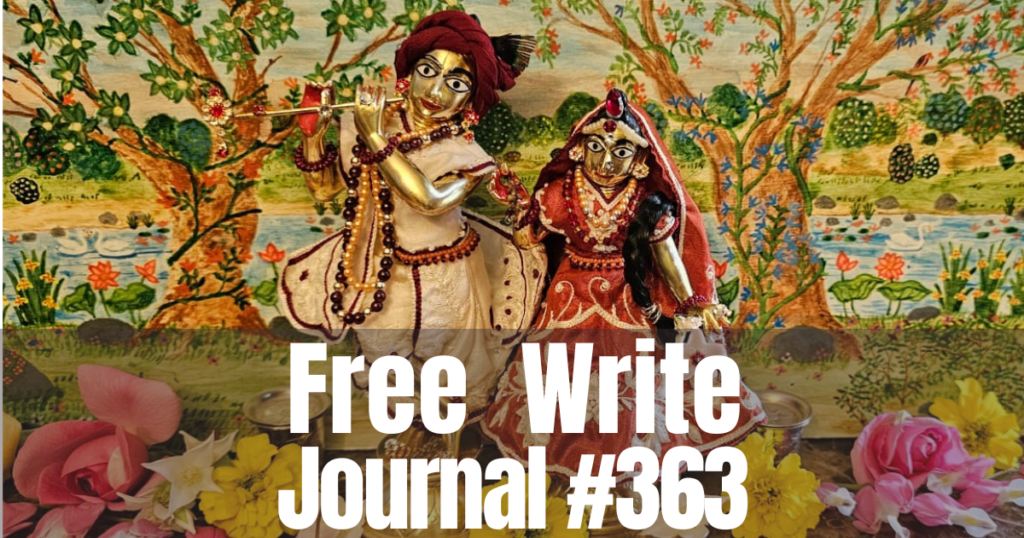
We need to expand our team of proofreaders as we aim to increase the rate of republication of Satsvarūpa Mahārāja’s books as well as new books that he writes.
This includes a need for fluent bilingual Spanish and English speakers to proofread Spanish translations (we currently have around 20 Spanish translations waiting to be proofread).
Anyone interested in this particular service should contact Manohara dāsa at [email protected]
If you would like to help, please contact Kṛṣṇa-bhajana dāsa at [email protected] or [email protected] and we will find you a service that utilizes your talents.
Chilly. My foot hurts, walking, limping, on the white stone paths between farmhouses. The narrow roads lead right up to people’s doors. I avoid approaching their houses by walking back and forth. A buzzing sound comes from a tall steel electrical tower. Dawn arrives and the sky lightens. I spoke what I could and have now gone back inside. Not a single one of the past nineteen rounds has been attentive or prayerful. It is hard to say what your chanting actually is. But it is.
******
I wrote our host a note thanking him for the accommodations and adding, “My japa-vrata is going well.” That’s a general comment. One doesn’t say in a quick note how terrible the inattention is. I didn’t write, “The japa-vrata is revealing to me that I am dead to the holy name. It can be concluded that I am a great offender, but I am also dead to that.”
******
While chanting the twenty-fifth round, I noticed a bug flailing on its back. I saw one recently in Trinidad in the same predicament. They flail their spindly legs in the air and rock their bodies back and forth to get leverage, but they can’t do it. It reminded me of how I feel when I am being pressed down, unconscious, in a dream. I try to become conscious by a jerk of my will, but I can’t get out from under the weight. I know from the bug in Trinidad that eventually they catch the right angle or something happens—they get some mercy from their centipedal prayers—and suddenly they are upright again. I am like that, helpless in japa. My note was just a social lie, written with the same ingenuousness by which you tell lies to keep things pleasant. But your japa doesn’t lie.
******
Can’t even keep track of how many you have chanted. That means you can’t keep attention as to which direction you are going on the beads, and so you change direction in mid-round and go the other way, and drowse, notice it’s over ten minutes and you are not near the end. What did I mean when I wrote him, “The japa-vrata is going well”?
******
Srila Rupa Gosvami, I see your picture on my desk. You are chanting japa in a sublime mood, emanating an aura of krsna-prema. I pray to you, Rupa Gosvami Prabhupada, tivrena bhakti-yogena yajeta purusam param, please let the powerful ray of bhakti-yoga strike me and raise me from the dead. Let that miracle occur. I am on my back, flailing. I pray at the lotus feet of your pure chanting, that a stray drop of your harer nama honey may fall upon me and transform me.
******
This is the confessional side of the truth. Is there a yearning side? Yes, but should I paint imaginative pictures of what I would like to be? “When my offenses ceasing, taste for the name increasing, when in my heart will Your mercy shine? When, oh when will that day be mine?” (“Kabe Ha’be Bolo,” Verse 1).
******
Go ahead, imagine it: I am chanting, sitting on the windowsill, looking into the room. Suddenly I become aware of the mercy of harer nama. A sweetness descends and tears come to my eyes. I feel contrite for all the years of poor chanting and poor service. I jump down and make obeisances with no consideration of fatigue. Krsna, His Name, and His pastimes are all one, and they are speaking to my heart and mind…..But that is fiction. When will I be able to stay awake and think of the holy name—acknowledge that harer nama is an entity worth paying attention to? When will I put aside the flow of thoughts and concentrate on chanting and hearing the maha-mantra? I can only go on striving. I am being carried on a long wave. There is nothing else to consider. I go past thirty-two rounds and keep on going. When in my heart will Your mercy shine?
******
Tire marks in the brown fields—I look out the window. Then back to my hands. Then back out again. You have done thirty-two rounds. But hardly does it ever occur to you what you are doing. You don’t think you are calling someone’s name. You don’t think you are spending time with Radha-Kanta, Radhanatha, with She who is dear to Syamasundara, or the Supreme Personality of Godhead appearing in His Name. You don’t. You stand by the window noticing your sore feet, or you sit on the bed (that’s the worst), or you sit on the windowsill and wonder what the neighbors will think of your gray-sweatered back as they drive past.
pp. 29-33
While the Visiting Sannyasi was massaging his Srila Prabhupada murti, he heard Srila Prabhupada lecturing from a 1969 talk on karma-yoga. Srila Prabhupada defined action and inaction. In the language of Bhagavad-gita, action means when you do something on your own account, then you enjoy or suffer the karma. But when you act on Krsna’s behalf and get no reaction—that is called inaction in action. It sounded so perfectly clear, theoretically. Then the visiting sannyasi thought, “Are my poems inaction or action?” He tended to apply whatever he heard of the philosophy as some kind of test or exposure or support of his writing poems.
The poems were inaction to the degree that they were service acceptable to guru and Krsna. Srila Prabhupada also spoke about “retirement.” Arjuna wanted to retire from action but Lord Krsna forbade him. Is poetry writing retirement? Heck no, it’s work, dedication, aliveness.
Srila Prabhupada asked the devotees if they had any questions. One of them asked, “Please explain again what is action in inaction and inaction in action.” Srila Prabhupada gave a practical example. He said his disciples were acting for Krsna and so there was no reaction for them. The visiting sannyasi thought, “It was so simple in those days to have our acts endorsed by Srila Prabhupada. Now we wonder more. I won’t give up trying.”
The Visiting Sannyasi looked out the window. He’s a poet and he knows it. Writing poems would be difficult. So he tried to do it at least these three more days, and he also had to take time to pack for the travels. They already stopped their daily meeting which they used to have for memorizing sastric slokas.
The Visiting Sannyasi kept a diary of sorts. Sooner or later I will have to write about that in this story. I don’t know the full extent of it and how relevant it is to our story—or whether the Visiting Sannyasi will even let us print some of it here. But at least I will let you know that when he is writing he’s not only writing poems. He thinks things out, and if you live near him it is not unusual to find something written on a note or newspage. For example he wrote this and we found it in the trash bag: “One thing is certain—chanting Hare Krsna is very important and also direct reading in Srila Prabhupada’s books. I have yet to conclude on whether my own writing, which is so dear to me, is actually sravana-kirtana. I’m still trying to understand its place in my spiritual life, whether it’s an absolute requirement on the level of sravanam kirtanam visnoh-smaranam, a solid irrefutable item of bhakti.”
Why? You’re just staging an opera.
No one is accusing you of
stealing time or misleading the Hare
Krsna movement. Oh a few, maybe,
but they accuse you of other wrongs,
like pretending to be a guru.
(We’ll consider that another time, Sneaky)
As for poems, you might as well
be up front.
No one cares one way or another.
The aratis will go on whether you write
or not and so will the bills come in the mail.
Someone will get a book on sankirtana and seriously
consider Prabhupada has given the truth.
And someone, drunk on wine or high on
a drug that promotes confidence and false ego,
will attack the members of the harinama
party, arms flailing—and you
can’t stop him with your poem.
Nevertheless Lord Krsna wants to know
what I am doing.
I am praying to approach those books
one after another over a long time.
I’ll cruise through them slowly. The Lord
will reveal Himself to me.
I will know Him just as you see the sun
in its own time when night is over,
and before.
I am praying even if I can’t stay awake
the prayer continues half-asleep,
staggering on my feet. I’ve been up
since midnight, what do you expect?
I’m praying to be a better person,
so I spend this dawn at least
seeking a breakthrough.
I follow the rules.
Obedient son.
My father won’t forget me
or turn me away.
They’ve got the wrong idea
about my poems. And I’ve got
the wrong idea about “them.”
Maybe they think a poem is a flowery
thing like a lampshade in poor taste,
or all-abstract so no one can understand it.
They call a poet “Commie” and “fag” and words we
used to use like “sissy,” “fruit” or “egghead”—
poems are made by fools like these
dreamers and jerks who don’t know where
the action’s at.
One brother said poetry is a sign of a
decadent society. He thought it comes when bhaktas
are idle. It should be stopped. Writing must
serve a more practical purpose, like in debates
and propaganda.
Others have the opposite idea and want to see
a poem that blooms in perfume and rhyme
where Lord Krsna and Radha meet each other and
meet you
and if you can’t do that then why bother?
But mostly the people are all silent and no one cares;
no one is at home, no one is minding the store,
the prairie is empty so go ahead and
say what you like.
Krsna is dancing in the leaves. He is the bluish dawn.
He is not here. He is in the spiritual abode which
is so far away you couldn’t get there by a
week of continual bus travel or hopping jets around
the globe until you’re staggering with fatigue and
say “I give up. Where is He?”
He’s in Vrndavana-dhama, He never leaves.
Krsna is dancing in the leaves, in the breeze of dawn.
pp. 65-68
The Lord . . . can I worship His form with Radha? I’m beginning to desire it. It’s how we become trained to become servants of Radha and Krsna.
The Pracetas pray that we jivas seem to prefer miserable material conditions.
“To deliver us from these miserable conditions, You have advented Yourself in this transcendental form. This is evidence of Your unlimited causeless mercy upon those of us who are suffering in this way.”
“Dear Lord, You are the killer of all inauspicious things. You are compassionate upon Your poor devotees through the expansion of Your arca-vigraha.” (Bhag. 4.30.27-28)
Here Srila Prabhupada writes,
“When the Lord is gradually satisfied with the service of a devotee, in due course of time He accepts the devotee as one of His many unalloyed servants. . . . Atheists may think that the devotees are engaged in idol worship, but the fact is different. Janardana, the Supreme Lord, accepts bhava, the attitude of service.”
The worshiping devotee may not even understand the value of the worship,
…. but the Supreme Lord, being bhakta-vatsala, accepts His devotee and in due course of time takes him home.
Thus it is the duty of every sincere devotee to accept the arca-vigraha at home or in the temple and worship the form of the Lord as advised in authorized scriptures and directed by the spiritual master.” (Bhag. 4.30.28, purport)
Didn’t Srila Prabhupada say he was going to a planet within the material world and his sincere disciples would join him there? We will go there to worship Radha-Krsna under his guidance. With him leading, we will become inspired to go out and preach again. I admit I have failed him in many ways, but still he has bound me with unbreakable ties.
I have desires, but my desires are mixed. I like to read poems and capture dreams, so I can use them in my writing. I want people to see that Krsna consciousness can be presented in many different literary forms. I want to penetrate by thought and artistry and personal feeling each of the genres in which I work. Srila Prabhupada said of my first book, Readings in Vedic Literature, that I had quoted the rascals (Indologists) without becoming contaminated. Now I want to learn from fellow sufferers how to transform suffering into art, but then do it myself in Krsna consciousness. That is my path.
Lord Krsna knows everything about us. He’s in our hearts. “Although we are very insignificant, why should the Lord not know our desires?” (Bhag. 4.30.29) Yet now I’m writing the most artless of forms, the diary. I can’t seem to measure up to any other structure. Maybe that’s one reason I was attracted to Kierkegaard: he uses various forms, including the novel, to preach his indirect communication and then to make direct, edifying discourses. It’s an author’s path.
The benediction the Pracetas ask of Lord Visnu: “Be satisfied with us.”
Srila Prabhupada:
“The devotee simply wants to be in the presence of the Supreme Lord—either in this world or the next—and engage in His service. That is the ultimate goal and benediction for the devotees.” (Bhag. 4.30.31, purport)
The Pracetas address the Supreme Lord as Ananta. We cannot conceive of His unlimitedness, but we can link up with His unlimitedness when we hear of Him. “Such understanding of the unlimited becomes unlimited by hearing and chanting.” (Bhag. 4.30.31, purport)
It’s nice to see devotees intent on service. New devotees have fresh enthusiasm and plenty of energy, but the old-timers can too. Srila Prabhupada has written that we don’t get tired. “If a person is Krsna conscious, he can work like a young man even if he is seventy-five or eighty years old. Thus the daughter of Kala (Time) cannot overcome a Vaisnava.” (Bhag. 4.27.24, purport) Krsnadasa Gosvami wrote the Caitanya-caritamrta when he was in his nineties.
This reference is important to me. Prabhupada is showing me that writing can go on and on and improve in old age.
“Thus jara, the effect of old age, does not harass a devotee. This is because the devotee follows the instructions and the determination of Narada Muni. . . . Apparently a devotee may grow old, but he is not subjected to the symptoms of defeat experienced by a common man in old age. Consequently, old age does not make a devotee fearful of death, as a common man is fearful of death.”
The devotee knows that after death he’s going back to Godhead. “Thus instead of depressing a devotee, advanced age helps him become fearless and thus happy.”
pp. 88-91
Srila Prabhupada was very strong in his denunciation of materialists. He would denounce even big industrialists as thieves. Everything belongs to Krsna, he said, and the capitalists (or communists) have taken far more than their God-given quota. Sometimes when disciples heard Prabhupada’s criticisms, they wondered how they could repeat such things to the nondevotees. Prabhupada himself spoke with businessmen, and on those occasions, devotees would see his successful method of explaining to self-centered men the concept of isavasya, a God-centered Society.
On a morning walk around White Rock Lake, devotees pointed out to Srila Prabhupada the mansion of one of the world’s richest oil men. The white building on the spacious property was barely visible in the distance beyond the lake. Prabhupada didn’t take much note of it as he walked along the shore, which was bordered on the waterside with tall palm grass, while the road before them was littered with paper and beer cans. A devotee described how he had tried to approach the oil billionaire to give him a Bhagavad-gita, but he had been successful only in giving a copy to one of the friendly entrance guards.
“What would you have said,” asked Prabhupada, “if you were actually able to see him?” About ten devotees walked with him, and one spoke out. “I would tell him that we have a school here in Dallas and that actually we are model citizens.”
“What else would you say?” Prabhupada asked. One devotee replied that she would invite him to visit the temple, and another said he would bring him prasadam.
“No,” said Prabhupada, “you should say to him, ‘You are a big thief. You have taken for yourself so much oil which all belongs to God. So now you will have to be punished.’” Prabhupada’s followers felt embarrassed that they had not given Prabhupada such a strong answer, and they were also surprised. As the quiet morning walk continued, Prabhupada went on to say that one day the lord of death would come for the oil billionaire and no entrance guards could stop him. At that time, no matter what the richest man in the world might say, death would take him away to face his karma.
Not long after Prabhupada’s visit to Dallas, the Texas billionaire died. Some of the devotees remembered Prabhupada’s words and how they never were able to approach the man. One of the devotees present on the walk was Dayananda dasa, who vividly recalled this whole incident years later, when he witnessed Prabhupada in the presence of a wealthy industrialist.
The scene was Mayapur and Prabhupada was taking his morning walk on the roof of the residential building. Jayapataka Swami introduced Prabhupada to a prominent businessman who had come to visit from Calcutta.
Speaking in English, Prabhupada greeted him pleasantly.
“I am pleased to see you,” said Prabhupada. “Thank you for coming to Mayapur. So, what is your factory?”
The businessman from Calcutta, a heavy-set man in an immaculate white dhoti, kurta, and vest, spoke in a loud voice.
“I manufacture glass,” he said.
“Hmm,” Prabhupada reflected. “So where does the glass come from?”
The man was now walking beside Prabhupada, along with other devotees and friends, as they circumambulated the roof, talking and viewing the surrounding flatlands of Mayapur.
“It is from silicon,” the man replied. “It is from sand.” “Yes,” said Prabhupada, “but who owns the sand?”
The Calcutta man was not only an intelligent businessman, but he was pious and could understand what Bhaktivedanta Swami, as guru, was driving at. He said, “Oh, the sand comes from Bhagavan.”
Prabhupada replied quickly, “Oh, you are stealing from Bhagavan?”
Prabhupada’s retort made everyone laugh—even the industrialist could not help but join in the laughter. After the quick exchange, the Calcutta businessman dropped toward the back of the group, and others came forward to ask Prabhupada their philosophical questions.
Prabhupada’s morning walks were often this way, fragmented conversations with different guests and devotees who would come forward and ask Prabhupada some query. He would answer one after another, sometimes developing different themes or going from one theme to another. After walking for about half an hour, the industrialist again moved to the front for another round of questions with Prabhupada. He had been considering what Prabhupada had said and he felt a little guilty.
“Swamiji,” the man offered, “although I may be taking from Bhagavan, but I am giving in charity also.”
Prabhupada smiled and replied, “Oh, you are just a little thief.” Again everyone on the walk laughed at Prabhupada’s last word on the subject. Thus Srila Prabhupada showed the practical application of the theoretical advice he had given in Dallas.
pp. 26-30
Srila Prabhupada writes, “We should not forget the chanting of the Hare Krsna mantra under any circumstances.” We want to pray to Lord Krsna by uttering His holy names.
harer nama harer nama
harer namaiva kevalam
kalau nasty eva nasty eva
nasty eva gatir anyatha
For spiritual progress in this Age of Kali, there is no alternative, there is no alternative, there is no alternative to the holy name, the holy name, the holy name of the Lord.
—Brhan-naradiya Purana, cited Cc Adi, 7.76
The Upanisads, Puranas, and Lord Caitanya Himself all declare that the chanting of the holy name is the only means to cross the ocean of nescience in Kali-yuga. Praying cannot succeed without this main prayer. In our prayers of gratitude, we should always thank the Lord and the previous acaryas for making union with God so accessible, simply by chanting His holy name.
There is no need to invent a new method or to adopt methods which were applicable in former millennia, such as dhyana-yoga. We cannot reach transcendence by the ascending process of our own efforts or mental speculations, even if we were to attempt this for many lifetimes. But the Supreme Personality of Godhead wishes to reveal Himself to us, and He does so by appearing in the form of His holy names. The Hare Krsna mantra is the Supreme Personality of Godhead as a transcendental vibration. Srila Prabhupada writes, “In the pre¬sent age, the vibration of the Hare Krsna mantra is the only process which is in a transcendental position beyond material contamination. Since the holy name can deliver a conditioned soul, it is explained here to be sarva-mantra-sara, the essence of all Vedic hymns” (Cc. Adi, 7.74). And in the Srimad-Bhagavatam, Srila Narada Muni declares to Vyasadeva, “Thus he is the actual seer who worships, in the form of transcendental sound representation, the Supreme Personality of Godhead, Visnu, who has no material form.” (Bhag. 1.5.38)
But the all importance of the holy names does not preclude the necessity to chant them prayerfully, with attention. Krsna will not appear if we say the names without thought or feeling for whom we are addressing or if we commit offenses to the holy names. Prabhupada quotes Bhaktivinoda Thakura: Nāmākāra, nāma bahira haya, nāmākāra, nāma nāhi haya [Prema Vivarta]—merely reciting the external syllables of the holy name does not mean that one is actually chanting the holy name (Lecture, January 23, 1974).
Therefore, just as in the practice of reciting sastric stotras or in praying personally, in the practice of calling on the holy name it is the quality of our utterances which counts the most. One can’t say, “I have no need for prayer, I just chant Hare Krsna,” if one’s chanting is but a mindless, muttered ritual. Chanting is the best form of prayer, and therefore it should be given the best attention.
In a lecture given in 1973, Srila Prabhupada stressed that chanting must be done priti-purvakam, with love. Prabhupada imitated the sound of a slurred, hackneyed recitation of the Hare Krsna mantra and said, “Not like that; but with priti, with love. Chant every name, Hare, Krsna, and hear. Here is Krsna. Here is Radharani.”
Bhaktivinoda Thakura singles out inattention as a great stunter of development. “Pramada may mean madness,” he writes, “but here the meaning is inattention or carelessness. It is from this offense that all other offenses spring.”
Bhaktivinoda Thakura analyses three kinds of inattentiveness: indifference, laziness, and distraction. We become indifferent to the holy name because we are absorbed in material desires. “While chanting japa daily, if his taste will be elsewhere he will show indifference to the name.”
In laziness, we allow our minds to remain sluggish or we even fall asleep. We give up chanting before we have reached our quota. The fault of distraction is that we are actually attracted to women, wealth, prestige, etc., and so we become inattentive to our own calls upon the Supreme Lord in His name-form.
Bhaktivinoda Thakura’s advice to counter pramada is to “take association of Vaisnavas who are properly chanting in a place sheltered from the material influence.” The enthusiasm of pure devotees will pass onto us, and we also will gradually chant as they do. Bhaktivinoda Thakura advises, “On Ekadasi and Appearance Days, one should stop thinking of eating all day and night, and chant in the company of devotees.”
Srila Prabhupada urges that we should chant the Hare Krsna mantra with love, and Bhaktivinoda Thakura advises that we must give up pramada or we are not even chanting the real names. But how can we actually blast through the mountain of indifference and lethargy and reach the pure land of the holy name? The answer is that we have to work for it, and beg for the mercy of the holy name. It is hard work, tapasya, but for the best cause. Srila Prabhupada has said, “An easygoing life and Krsna consciousness do not go well together,” and that is certainly true of japa-yajna for one who is still plagued by the ten offenses. Let us agree that we will never give up trying to improve our chanting, even when it seems hopeless.
The most important thing is to earnestly try and to strictly follow the vow of chanting a prescribed quota of daily rounds.
One may have other duties to perform under the direction of the spiritual master, but he must first abide by the spiritual master’s order to chant a certain number of rounds. In our Krsna consciousness movement, we have recommended that the neophyte chant at least sixteen rounds. This chanting of sixteen rounds is absolutely necessary if one wants to remember Krsna and not forget Him. Of all the regulative principles, the spiritual master’s order to chant at least sixteen rounds is most essential.
—Cc. Madhya 22.113, purport
pp. 50-56
Got up late again (1:40 A.M). That’s the nature of this time, I guess, to need extra sleep. Sometimes I think getting up at midnight is too stressful in general. Devotees sometimes tell me that too. But Prabhupada did it, and it’s a great way to get a head start on the day. Is it allowable? I do it as a kind of sacrifice to advance my Krsna consciousness and preaching. Early rising makes my writing more potent and allows me to find the solitude I need to chant wherever I am in the world. Even when I am with many people in a busy, noisy place, I can make good use of those hours. Again, I say, Srila Prabhupada did it, and I like to follow him in it. When I get up, I place his Dictaphone in front of him and sit under a lamp to study beside him.
Thinking of that guy who wants to know what’s in my pen box.
You are you and broadcast
your own inadequacy.
Why don’t you repeat directly
the words of Vyasa
and not your own?
I do that, pal, but it
comes out with a Brooklyn
accent and nasal tones, “Didja
go?” “Do ya wanna?”
I can’t help it; I was born
that way and accumulated
many sins and many sins have
been driven away. So, I
want to praise Krsna and Srila
Prabhupada, and it comes out
this way.
This is direct.
Vyasa wrote Brahma-sutra.
To speak it direct
is glorious and to interpret
makes havoc.
You see?
Hang on, no headache so far. Pitching a no-hitter after two and a half innings. But headache may be part of life for me. No harm if I try to get rid of them.
You write boy, you write,
I dig your banjo.
Lemme hear it now.
Twang-a twang of hurry
Om O hurry Om and sing
in health clinic tones
the way of The Stranger
by Albert Camus.
O Hari Om
and sing wild stranger,
lone-ranger
in a Tamil Nadu hut.
I am not a nut
or crook or Nixon
follower. Not berserk—
gone but servant of my
guru who wears light
silk saffron, and I’m his
servant, you see?
Yeah, I see—right through you in your yogi pants with drawstring belt. I see you in the Matsya asana and the back stretch. You got a long way to go to get limber and strong in bodily concept of life.
The heart of a nondevotee
of Krsna, isn’t clean, isn’t
right. It’s a great sin in hygiene,
the doctor says, to eat when
you’re not hungry. It’s
far worse not to worship
the lotus feet of Govinda.
My schemes and God’s will. After surrender there is still free will. Catch you later.
Busy patient: ate, changed sheets, stashed valuables in closet, sat up after late morning meal (first in day) before taking rest, and wrote.
Thanks.
You guys are really into this full-time health care.
Not much we can do now but to go ahead with it. I read in the Caitanya-caritamrta how Sankara is an incarnation of Lord Siva appearing in Kali-yuga to bewilder the atheist with his compromised philosophy, something between atheism and theism.
I asked the doctor why they interviewed the big cardiologist who did India’s first heart transplant. We discussed that, and then he asked me what I was writing. I couldn’t think of anything to say. I finally stuttered something and he helped me by saying, “More about Prabhupada’s teachings.”
“Yes, and Lord Caitanya,” I added. He said he heard I had traveled with Srila Prabhupada. I said yes, and that I used to give him a massage. I told him that Prabhupada kept good health habits but also sacrificed his health to preach. If a doctor told Prabhupada not to travel by airplane, Prabhupada would say, “I must.” The doctor was impressed.
Then I said, “Prabhupada said, “I’m not ‘Doctor dasa’ but ‘Krsna dasa.”
pp. 256-58
SDG singing and clapping:
hare krsna hare krsna, krsna krsna hare hare/
hare rama hare rama, rarna rama hare hare
I’m stopped up right now.
Boy, this radio show is supposed to be a place where I don get stopped. What’s the problem? I am unworthy.
If I rap about a Hare Krsna community, that’s bad business. I remember Subhananda writing an essay while he was a devotee, about our activities. He described the devotees chanting japa in the morning. He described what it would sound like to an outsider —all these different voices chanting. He said some of them gobble like turkeys, and then he used other words—“squawk” and “burble.” The japa sessions are a strange cacophony of sounds. In a kind of droll yet sympathetic way, he clued the outsider in to what a big japa session is like in a Hare Krsna temple. Even the devotees found it humorous. I liked it at the time, but it wasn’t long afterward that Subhananda again became Steve Gelberg, wanted to be a writer and decided to write of his exit from the Hare Krsna movement.
You’d better be careful with your waggish tongue and don’t tease the devotees. Better that you tease yourself if you’re in the mood to tease.
Okay, you shut my mouth. I can’t play a trumpet, I can’t play a saxophone, I can’t play a violin because the strings are made of cat gut, I can’t eat voraciously, I can’t eat chocolate, so what can I do?
You can give up this body and the bodily concerns.
Oh, the powerful mind. I say that not in worship, but in recognition of this raging back and forth, tyaga-bhoga-muscled instrument which can be your best friend or your worst enemy. Lord Rsabhadeva was so aware of the dangerous tendencies of the mind that he never trusted it. The question was asked why he didn’t use his mind for yoga-siddhis. The answer is given that he didn’t trust the mind. He thought if anything wonderful could come from his activities, it would be because Krsna made it happen. It’s better, he said, to always engage the mind in Krsna’s service.
Of course, Prabhupada wants us to be safely ensconced in Krsna consciousness, but at the same time to take risks and to be daring. We have to learn how to do that. He said that a sannyasi could wear Western clothes to preach. He knew that his devotees were traveling and sleeping in vans and meeting nondevotees all day, which meant women too, in order to sell his books. He knew his devotees were straining to collect money to pay mortgages. He himself had accepted all kinds of unusual situations in order to preach, especially in the early days in New York City. But Krsna always protected him and will always protect the devotees.
However, you have to have good concentration. You can’t only pretend you are preaching while internally you are enjoying the “unusual situations.” Bharata Maharaja was feigning meditation near the end. Inside, he was really thinking about the deer.
“Alas, the small deer, while playing with me and seeing me feigning meditation with closed eyes, would circumambulate me due to anger arising from love, and it would fearfully touch me with the points of its soft horns, which felt like drops of water” (Bhag. 5.8.21).
Instead of meditating on Vasudeva, he was meditating on a deer.
Worship is useless if it is only the outer form of worship. Real Krsna consciousness can’t be feigned. That’s what’s so unfortunate about chanting—we’re only chanting the outer form of the holy name. One can pray, “Krsna, please, please, please, let me chant. I don’t like to chant, but I want to chant. I want to like to chant. I want to be encapsulated in the chanting, to take to it wholeheartedly like the pilgrim who searched out and found perpetual prayer.”
A great prayer, even if I don’t make it enough. Sometimes I try gadgets to help me increase my chanting—a stopwatch to time the first sixteen, to stand on my head, to light three candles, whatever it takes.
But none of the gadgets work forever. It didn’t work for long when I used to hold a mirror up in front of my mouth and watch that I was saying all the words. The gadgets work for a while. We’re always trying something.
So folks, I’m talking to you out there. You also have to improve. When I talk to myself, when I talk about myself, it’s not just my solipsism. It’s for you too. You ought to, I ought to, we all ought to improve our chanting. Then we’ll see those sparkling, melting snowdrops that Disney tries to paint, only we’ll see the real thing. We’ll see the sparkle in Krsna’s eye.
What do you mean, “See the sparkle in Krsna’s eye”?
See the sparkle at Krsna’s lotus feet then? Okay, maybe I shouldn’t have said it. Maybe it was extravagant. But you know what I mean. Instead of seeing a Disney painting heralding the birth of Bambi, see the sparkle of a world pervaded by sweetness and spiritual bliss. Because a devotee is happy. How is he happy? By chanting. Evam prasanna-manaso, bhagavad-bhakti-yogatah. Yes, he’s always happy because he chants Hare Krsna. We’ll feel some of that, and we’ll feel some regret that we don’t chant well. Now we just grind, grind, grind, like grinding wheat into flour. Grind, grind, grind, Hare Krsna Hare Krsna.
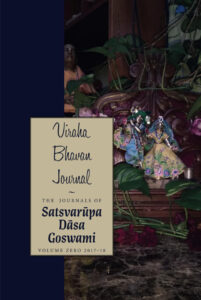
Viraha Bhavan Journal (2017–2018) was written by Satsvarūpa Mahārāja following a brief hiatus in writing activity, and was originally intended to be volume 1 in a series of published journals. However, following its completion and publication, Mahārāja again stopped writing books, subsequently focusing only on what became his current online journal, which began in August of 2018.
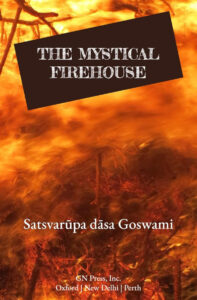
At first, I took it hard that I would have to live surrounded by the firemen, and without my own solitude. After all, for decades I had lived in my own house with my own books and my own friends. I was also now a crippled person who couldn’t walk, living among men who did active duties. But when Baladeva explained it to me, how it was not so bad living continually with other firemen and living in the firehouse with its limited facilities, I came to partially accept it and to accept the other men. I came to accept my new situation. I would live continually in the firehouse and mostly not go outside. I would not lead such a solitary life but associate with the other firemen.
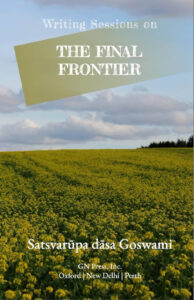
Let me write sweet prose.
Let me write not for my own benefit
but for the pleasure of Their Lordships.
Let me please Kṛṣṇa,
that’s my only wish.
May Kṛṣṇa be pleased with me,
that’s my only hope and desire.
May Kṛṣṇa give me His blessings:
Kṛṣṇa Kṛṣṇa Kṛṣṇa Kṛṣṇa Kṛṣṇa he
Rāma Rāghava Rāma Rāghava
Rāma Rāghava rakṣa mām.
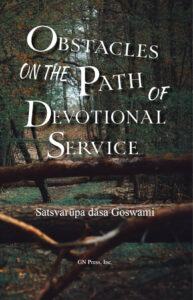
You mentioned that your pathway has become filled with stumbling blocks, but there are no stumbling blocks. I can kick out all those stumbling blocks immediately, provided you accept my guidance. With one stroke of my kick, I can kick out all stumbling blocks. —Letter by Śrīla Prabhupāda, December 9, 1972.
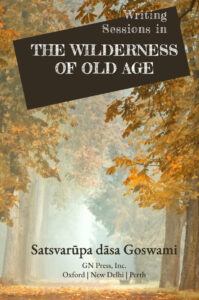
The Writing Sessions are my heart and soul. I’m trying my best to keep up with them. I am working with a few devotees, and they are far ahead of me. I wander in the wilderness of old age. I make my Writing Sessions as best I can. Every day I try to come up with a new subject. Today I am thinking of my parents. But I don’t think of them deeply. They are long gone from my life. Śrīla Prabhupāda wrote a poem when he was a sannyāsī, and he said now all my friends and relatives are gone. They are just a list of names now. I am like that too. I am a sannyāsī with a few friends. I love the books of Śrīla Prabhupāda. I try to keep up with them. I read as much as I can and then listen to his bhajanas.
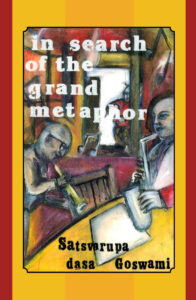
The metaphor is song. Explain it. Yes, particulars may not seem interesting or profound to readers who want structured books.
Wait a minute. Don’t pander to readers or concepts of Art. But Kṛṣṇa conscious criteria are important and must be followed. So, if your little splayed-out life-thoughts are all Kṛṣṇa conscious, then it’s no problem.
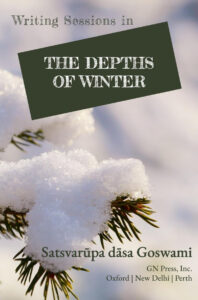
I am near the end of my days. But I do like the company of like-minded souls, especially those who are Kṛṣṇa conscious. Yes! I am prone to Kṛṣṇa consciousness. I have been a disciple of Bhaktivedanta Swami Prabhupāda for maybe almost sixty years. Sometimes I fail him. But I always bounce back and fall at his feet. It is a terrible thing that I sometimes do not have the highest love for him. It is a terrible thing. Actually, however, I never fall away from him. He always comes and catches me and brings me back to his loving arms.

This edition of Satsvarūpa dāsa Goswami’s 1996 timed book, Upstate: Room to Write, is published as part of a legacy project to restore Satsvarūpa Mahārāja’s writings to ‘in print’ status and make them globally available for current and future readers.
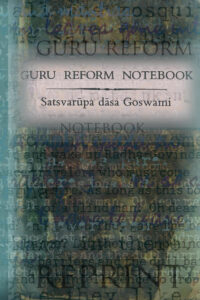
A factual record of the reform and change in ISKCON guru system of mid ’80s.
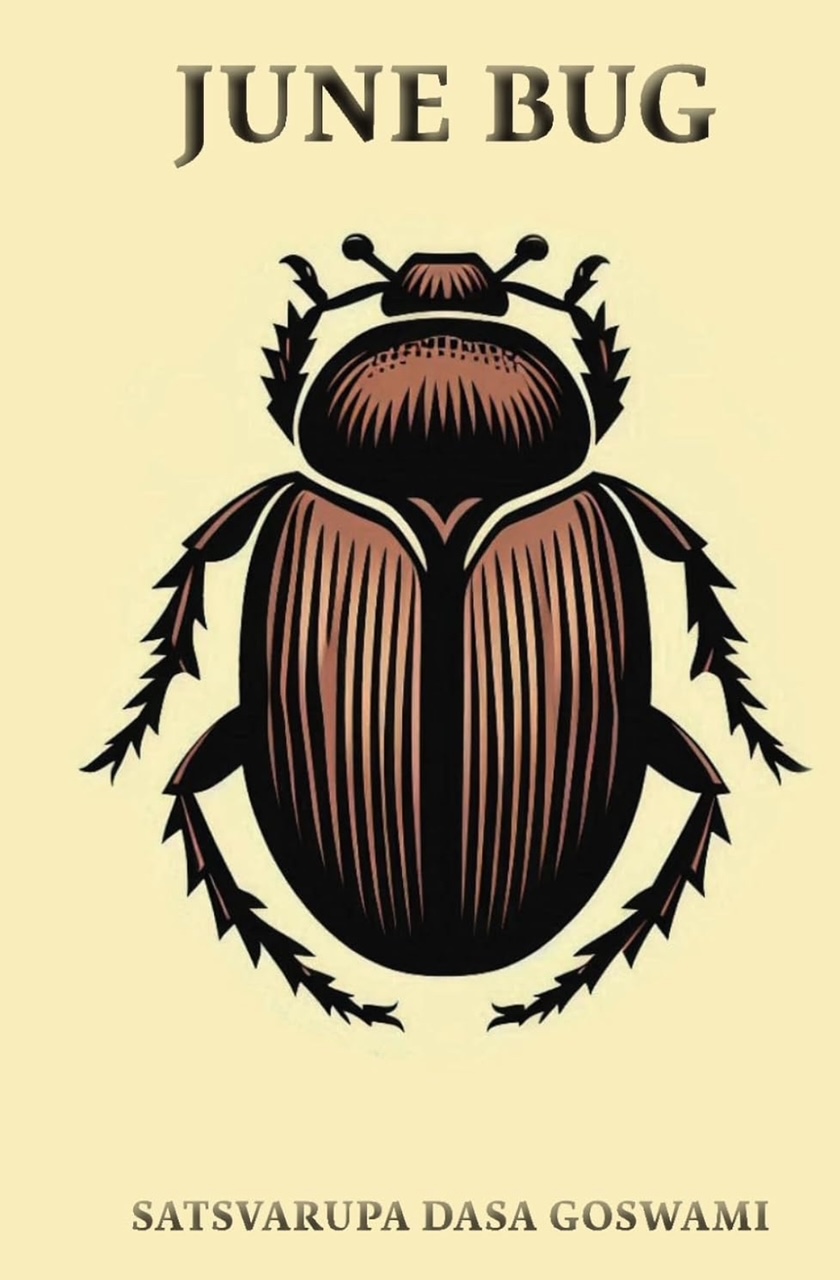
Readers will find, in the Appendix of this book, scans of a cover letter written by Satsvarūpa Mahārāja to the GN Press typist at the time, along with some of the original handwritten pages of June Bug. Together, these help to illustrate the process used by Mahārāja when writing his books during this period. These were timed books, in the sense that a distinct time period was allotted for the writing, during SDG’s travels as a visiting sannyāsī
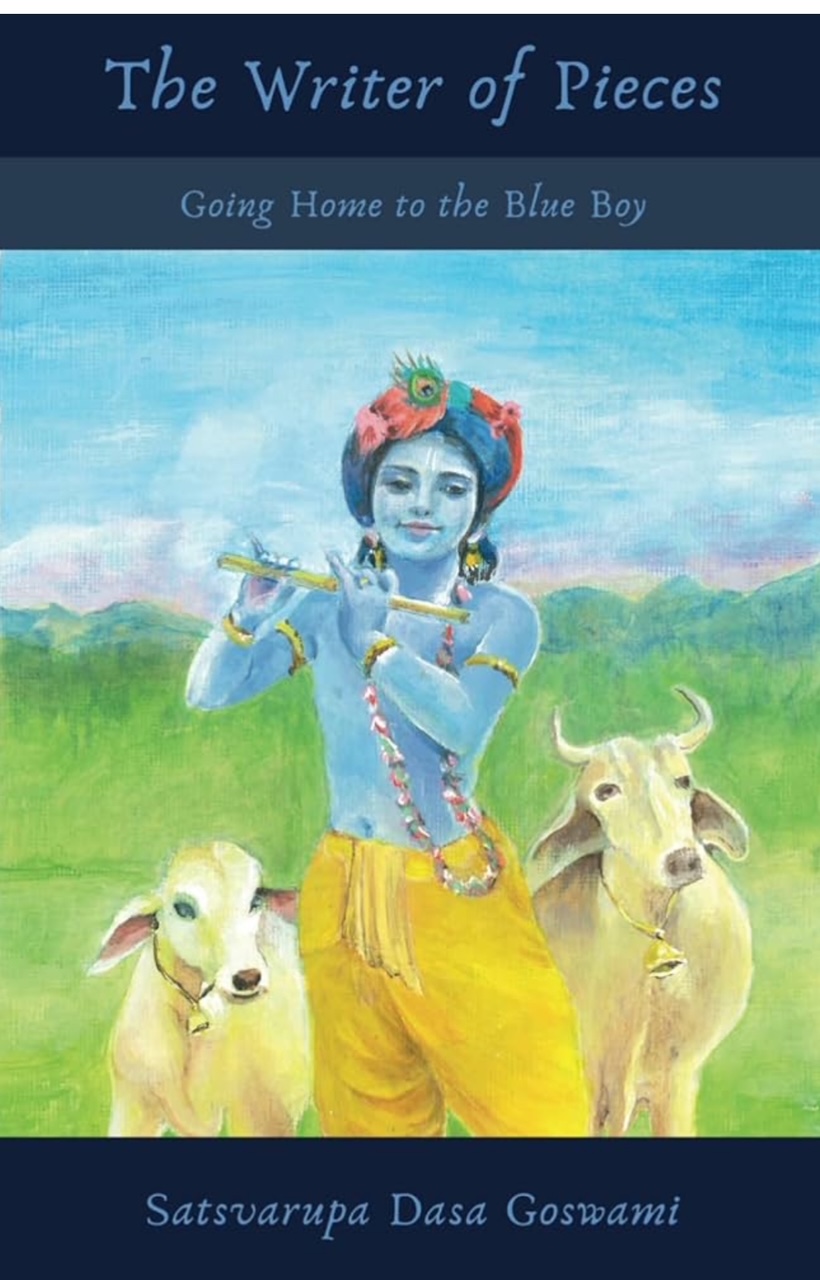
Don’t take my pieces away from me. I need them dearly. My pieces are my prayers to Kṛṣṇa. He wants me to have them, this is my way to love Him. Never take my pieces away.
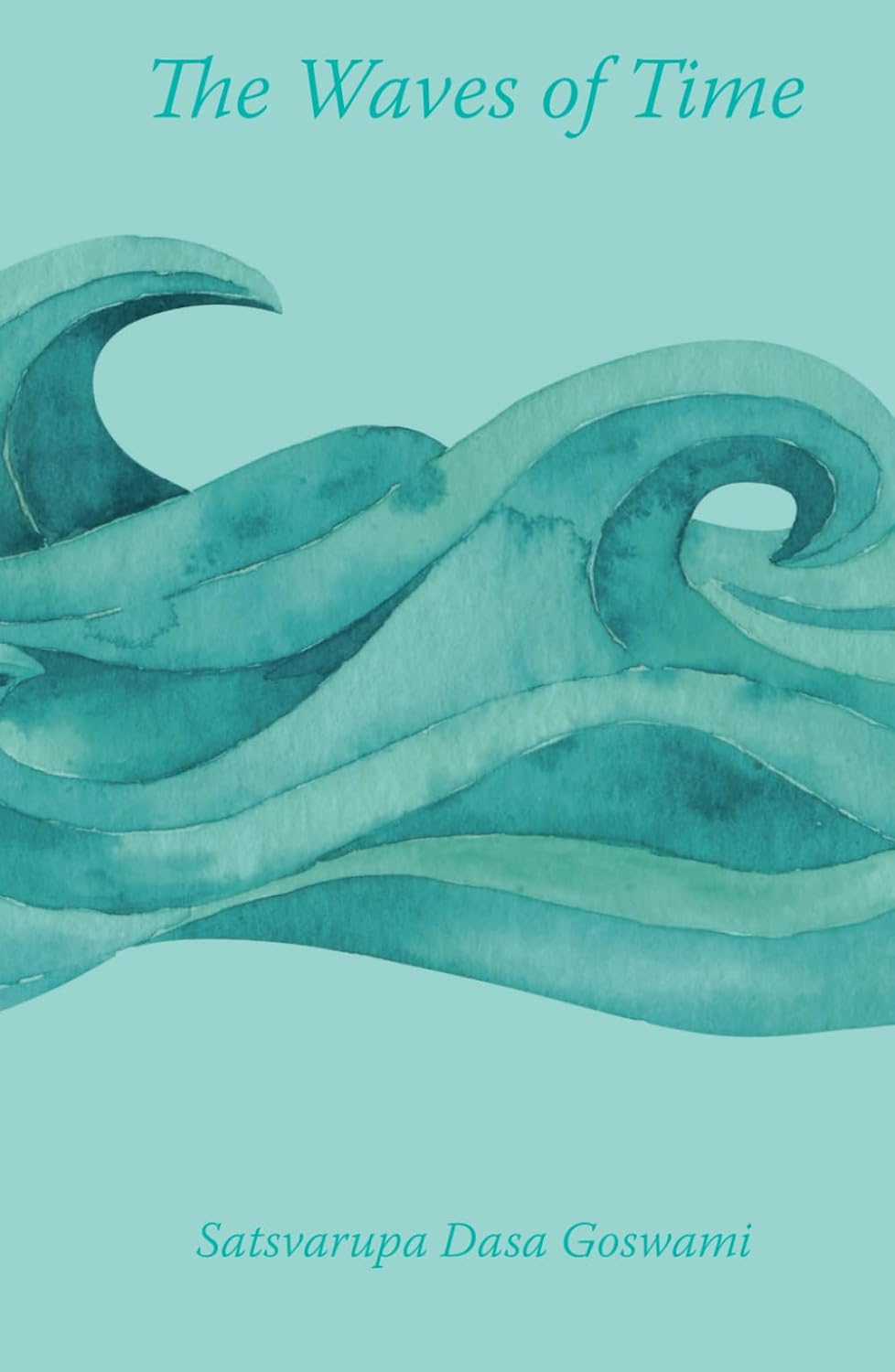
Many planks and sticks, unable to stay together, are carried away by the force of a river’s waves. Similarly, although we are intimately related with friends and family members, we are unable to stay together because of our varied past deeds and the waves of time.

To Śrīla Prabhupāda, who encouraged his devotees (including me) To write articles and books about Kṛṣṇa Consciousness.
I wrote him personally and asked if it was alright for his disciples to write books, Since he, our spiritual master, was already doing that. He wrote back and said that it was certainly alright For us to produce books.

I have a personal story to tell. It is a about a time (January–July 1974) I spent as a personal servant and secretary of my spiritual master, His Divine Grace A.C. Bhaktivedanta Swami Prabhupäda, founder-äcärya of the International Society for Krishna Consciousness. Although I have written extensively about Çréla Prabhupäda, I’ve hesitated to give this account, for fear it would expose me as a poor disciple. But now I’m going ahead, confident that the truth will purify both my readers and myself.

First published by The Gītā-nāgarī Press/GN Press in serialized form in the magazine Among Friends between 1996 and 2001, Best Use of a Bad Bargain is collected here for the first time in this new edition. This volume also contains essays written by Satsvarūpa dāsa Goswami for the occasional periodical, Hope This Meets You in Good Health, between 1994 and 2002, published by the ISKCON Health and Welfare Ministry.

This book has two purposes: to arouse our transcendental feelings of separation from a great personality, Śrīla Prabhupāda, and to encourage all sincere seekers of the Absolute Truth to go forward like an army under the banner of His Divine Grace A.C. Bhaktivedanta Swami Prabhupāda and the Kṛṣṇa consciousness movement.

A single volume collection of the Nimai novels.

Śrīla Prabhupāda was in the disciplic succession from the Brahmā-Mādhva-Gauḍīya sampradāya, the Vaiṣṇavas who advocate pure devotion to God and who understand Kṛṣṇa as the Supreme Personality of Godhead. He always described himself as simply a messenger who carried the paramparā teachings of his spiritual master and Lord Kṛṣṇa.

Dear Srila Prabhupada,
Please accept this or it’s worse than useless.
You have given me spiritual life
and so my time is yours.
You want me to be happy in Krishna consciousness
You want me to spread Krishna consciousness,

This collection of Satsvarūpa dāsa Goswami’s writings is comprised of essays that were originally published in Back to Godhead magazine between 1966 and 1978, and compiled in 1979 by Gita Nagari Press as the volume A Handbook for Kṛṣṇa Consciousness.

This second volume of Satsvarūpa dāsa Goswami’s Back to Godhead essays encompasses the last 11 years of his 20-year tenure as Editor-in-Chief of Back to Godhead magazine. The essays in this book consist mostly of SDG’s ‘Notes from the Editor’ column, which was typically featured towards the end of each issue starting in 1978 and running until Mahārāja retired from his duties as editor in 1989.

This collection of Satsvarupa dasa Goswami’s writings is comprised of essays that were originally published in Back to Godhead magazine between 1991 and 2002, picking up where Volume 2 leaves off. The volume is supplemented by essays about devotional service from issues of Satsvarupa dasa Goswami’s magazine, Among Friends, published in the 1990s.

“This is a different kind of book, written in my old age, observing Kṛṣṇa consciousness and assessing myself. I believe it fits under the category of ‘Literature in pursuance of the Vedic version.’ It is autobiography, from a Western-raised man, who has been transformed into a devotee of Kṛṣṇa by Śrīla Prabhupāda.”
 The Best I Could Do
The Best I Could DoI want to study this evolution of my art, my writing. I want to see what changed from the book In Search of the Grand Metaphor to the next book, The Last Days of the Year.
 a Hare Krishna Man
a Hare Krishna ManIt’s world enlightenment day
And devotees are giving out books
By milk of kindness, read one page
And your life can become perfect.
 Calling Out to Srila Prabhupada: Poems and Prayers
Calling Out to Srila Prabhupada: Poems and PrayersO Prabhupāda, whose purports are wonderfully clear, having been gathered from what was taught by the previous ācāryas and made all new; O Prabhupāda, who is always sober to expose the material illusion and blissful in knowledge of Kṛṣṇa, may we carefully read your Bhaktivedanta purports.

I use free-writing in my devotional service as part of my sādhana. It is a way for me to enter those realms of myself where only honesty matters; free-writing enables me to reach deeper levels of realization by my repeated attempt to “tell the truth quickly.” Free-writing takes me past polished prose. It takes me past literary effect. It takes me past the need to present something and allows me to just get down and say it. From the viewpoint of a writer, this dropping of all pretense is desirable.
 Geaglum Free Write
Geaglum Free WriteThis edition of Satsvarūpa dāsa Goswami’s 1996 timed book, Geaglum Free Write Diary, is published as part of a legacy project to restore Satsvarūpa Mahārāja’s writings to ‘in print’ status and make them globally available for current and future readers.